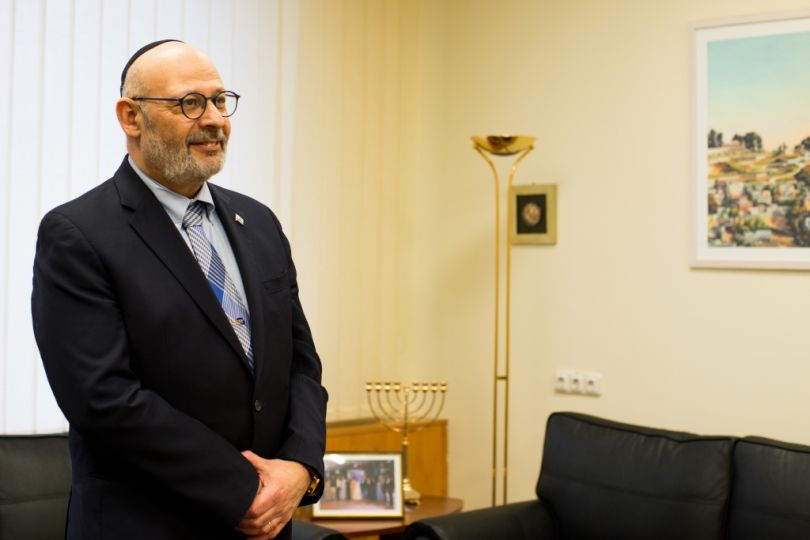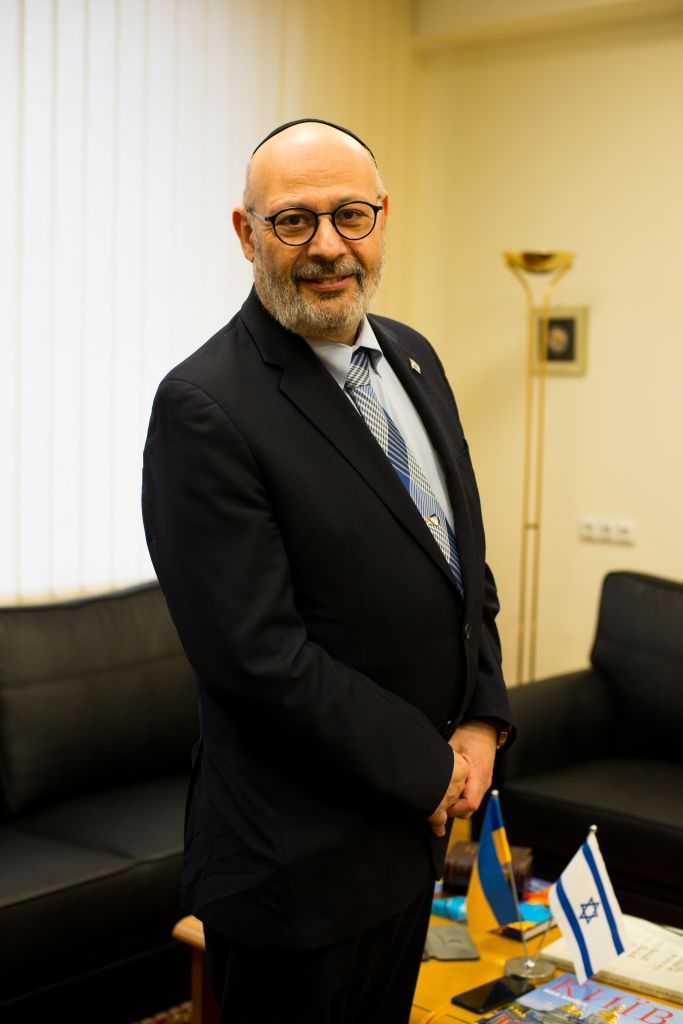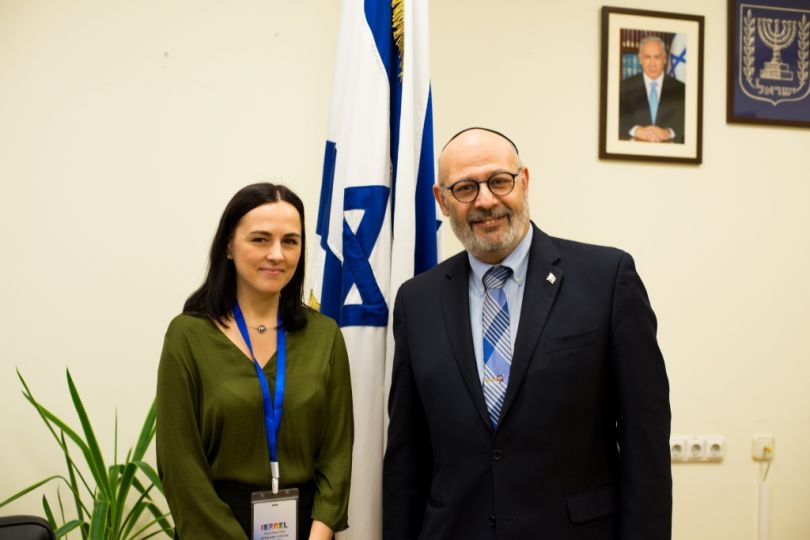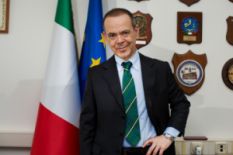Mr. Ambassador, what was your first impression about Ukraine?
The country is boiling, in a good sense of the word. People want to have a change and people are working on it. It is not easy. It is like when you have a huge ship and you have to change the course. It takes time, but from everything I see around and from what I understand while speaking with people, the nation wants to have this change. I see it on all the levels (not only political one) that people are doing their best in order to have positive changes.
What do you think about our mentality? Are Israeli and Ukrainian cultures similar or not?
Yes, we are alike, our people and your people are good and they want to help others. This desire of wanting to help others is part of the mentality where everyone understands that they are not an individual, but a part of community. I think we have this in common and this is something very strong. The same is about family values - they are very important for both cultures.
And what is different from your point of view?
I think that in Israel we are more open for quick changes. And for you it is not so simple to change plans quickly at the last moment.
Recently, at the end of January 2019 Free Trade Agreement has been signed between our countries. According to Petro Poroshenko that was a historic day in the relations between Israel and Ukraine. How do you see the benefits of this agreement and what are the next possible steps for cooperation between our countries?
First of all, it is really something historical that has happened. Israel has only 9 Free Trade Agreements. It is something very important because on the one hand it helps to decrease the cost of living in both countries, and on the other hand it increases the quality of life by opening the market to more products. This is the first step and a very positive thing. For the future I see the evolution of businesses in both countries in terms of export/import, creation of joint ventures - business people from both countries come and meet and see what they can do in order to elaborate on what has been signed.
The history of Jewish people in Ukraine is not simple and still some of its aspects have not been officially recognized. How do you see the best way to face up to our complicated heritage and to move on in building stable and friendly relationships?
I think that the history has to be learned with all its sides – good and bad, as it has been done in Germany after WWII. It teaches also that in the past courageous people have been ready to admit that something has happened. There were also evil people. And they should be named. This is one thing.
Yes, in Ukraine bad people are named. There is no question about it. The problem starts with the complexity of some personalities. And what I say to my Ukrainian friends is: “You have to talk about all the sides of the personality of your heroes whatever they did, good things and bad things”. People have to know all the facets and have to understand all aspects of the personality which are complex. That time was complicated.
We are trying to begin new projects with schools. And I am so glad that schools have already applied to us asking to implement these projects together. I would like school children to have the possibility to learn the Jewish history of their town/village in Ukraine to know what has happened not only at the end, but in the past. In Ukraine there were towns with 80% of Jewish people in Galicia and Volyn’. And something happened. So the kids should have a chance to learn what has happened together with Israeli schoolchildren.
When you are learning this history together, by understanding that something bad has happened, you are building a bridge. It is very important to know all the aspects of the history of evil people as well as of good people who have saved Jews. It is about studying all the complexity of this history. And then at the end of the academic year the children can finish this project by doing something together like, for example, going to the Jewish cemetery and cleaning it or marking the place where the Jews have been killed. And then you are slowly but surely understanding the complexity of the history and building new bridges to the future.
Recently, in one of your interviews you have talked about the necessity for all countries to agree about definition of anti-Semitism adopted by the International Holocaust Remembrance Alliance (IHRA). Taking into account the previous question and this definition how do you see the level of anti-Semitism in Ukraine? And what else (in addition to school projects) do we have to do to improve the situation?
It is important to have a clear definition of anti-Semitism. Some countries of the EU agreed on the definition of the International Holocaust Remembrance Alliance (IHRA), and adopted it. France was the last one to adopt it. Why is it so important? Because the moment you have a common ground, a common definition, you can understand if it is or not anti-semitism.
The level of violent anti-Semitism in Ukraine is one of the lowest in Europe. On the other hand you have this kind of anti-Semitism that people don’t even understand that this it is! For example, by accusing the Jews collectively of something, like saying that all the Jews are ruling the media sources in this country. You have some Jewish people who own some media but it is not «The Jews».
One more example is saying that the Jews are responsible for bad economic situation in the country. Maybe you have some, but again, this is connected to individual persons but not to all the Jews. Accusing the whole group for something is anti-Semitism.
Jewish people are a part of the Ukrainian nation. There are some Jews fighting in the East of the country. I know one officer there. And your Prime Minister is Jewish, but it does not matter if he is Jewish or not, what matters is the work that he is doing. This is important. And this is a problem we have here. People don’t even feel that they are anti-Semitic by using a terminology which is anti-Semitic, or accusing someone to be a Jew, like an offensive curse. All these things should be taught and they can be taught correctly only if you have the definition. If you adopt it – then you can say: “Guys, this is anti-Semitism. It is not freedom of speech”.
Israel is in the list of top countries developing science, medicine and IT sphere. And it is not a secret that young generation of Ukrainians is very talented as well. In particular, our IT specialists are valued all over the world. How do you see our collaboration in IT and are there any free educational programs, courses or scholarships that could be joined / received by young Ukrainians in order to get technical / IT education in Israel?
There are about 15000 Ukrainians who work for Israeli IT companies here in Ukraine. They don’t have to leave the country; they stay home close to their families and get high salaries and good conditions. They get experience which helps them to go on to the market as highly qualified specialists. You have great universities here and you have good human resources.
We don’t have any agreements about scholarships for youth but we have courses for the specialists to improve their qualification. They have to pay only for flight ticket and the rest is paid by Israel. We hope that with new government and new budget there will be some open courses.
But we have good experts. Last year there were training courses organized for Ukrainian specialists in Israel (from women empowerment to inclusive education, but one of the main topics for Ukraine is Innovation). In the agricultural sector we have 40 000 farmers trained by Israeli specialists. This year 2019 we bring our agricultural experts to Ukraine for 2 weeks in 4 regions on the South of Ukraine. It is called MASHAV – our international development cooperation agency.
At the end of February 2019 our mayor Vitali Klitschko took part in the 33d International Conference of Mayors in Israel. Kyiv is developing step by step. What are your personal impressions about Kyiv and expectations as to its improvement?
I have to say that traffic jams are not the problem only for Kyiv. We have a new road in Israel – Road 6 and you have to pay for this road. And you are stuck in traffic jam there anyway. Somebody says it is like paid parking (smiling).
Infrastructure is always something where you are one step behind of what you need at the moment. In Israel we need to develop more our public transportation. And here maybe you have to think about 2 things: if I built a new city I would make more lanes for public transport and more lanes for bicycles only.
It is a problem of a city like Kyiv with all the hills that you have, I mean you can die of a heart-attack at the end (smiling). Your mayor told me that he would like to take me to a tour around the city by bicycles. I told him: “I am not a boxing champion. I’d better skip this.” 
But the problem of the cities’ development is not only here, it is everywhere around the world. This is the reason why such conferences are essential – the mayors exchange their experience and stories of challenges and success. At this conference there was an exhibition about innovation for municipalities. This is a trend that can help the cities to develop in the right direction making infrastructure more convenient and up-to-date.
Israel knows a lot about ability to develop in spite of state of war as well as using diversity of the nation to make the country stronger and better. Israel has been influenced by Jewish immigrants from all over the world, many of whom have made significant contributions to science, politics and the arts. What would you advise Ukrainians about making our country better using our diversity?
Believe in life and think that if you are not having a good life all together - the enemy wins. The enemy always wants to see the people in depression, people who don’t live their lives. I was amazed last week when 2 missiles were launched (we know Iran is behind it) on Tel-Aviv. People were parting in Tel-Aviv; people are always partying there. And people were continuing to party! I mean the missiles are falling down, some people went to the shelter, waited for 10 minutes, so nothing was happening, they went out and continued to party. Some told: “If my parents didn’t call me I would not know what happened”. I called my son in Tel-Aviv and asked him: “Are you ok?” He said: “About what?” I explained about missiles. He said: “Ah that was the boom that I heard!” (laughing). I am not saying to take it on the very easy way but to know that ok, now this is the part of reality, but we won’t let them win! We will continue our life!
And I think that every part of the society brings something good to make the nation stronger. It is like Shakshouka (note: Israeli dish of eggs poached in a sauce of tomatoes, chili peppers, and garlic, commonly spiced with cumin, paprika, cayenne pepper, and nutmeg) – which is made of a lot of things even if you see everything like homogeneous red. There are a lot of ingredients inside which make it so tasty. Diversity is like Shakshouka :-)
Interviewed by Anna Vishtak
Photos by Yury Zaluzhny









